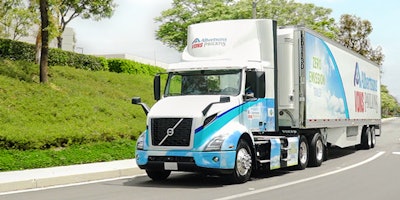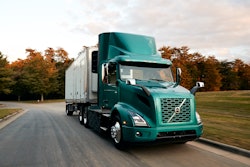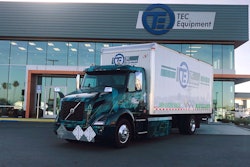
Albertsons Companies, the second-largest grocery chain in the U.S., recently took delivery of two Volvo VNR Electric trucks at its distribution center in Irvine, CA. The VNR Electric models from Volvo Trucks North America are the first zero tailpipe emission, battery-electric Class 8 trucks to be deployed in Albertsons Cos. company-wide fleet, and will be serving Albertsons, Vons, and Pavilions stores in Southern California. Albertsons has procured electric-powered transport refrigeration units from Advanced Energy Machines (AEM) to pair with its Volvo VNR Electrics, enabling Albertsons Cos. to make the first commercial 100% zero-emission grocery delivery with a Class 8 truck in the U.S. This inaugural delivery, which took place on May 28, 2021 at a LEED-certified Albertsons store in Irvine, CA, is an exciting step toward achieving the company’s sustainability goals.
“We are thrilled to continue our long-term partnership with Albertsons Cos. as they begin their journey toward fleet electrification and achieve this momentous accomplishment of a fully zero-emission grocery delivery,” said Peter Voorhoeve, President, Volvo Trucks North America. “Albertsons’ commitment to corporate sustainability is demonstrated by the steps it is taking to reduce its carbon footprint in its stores and fleet. We are confident that the Volvo VNR Electrics Albertsons is deploying in Southern California will enable the company to not only reduce its emissions, but to make reliable daily deliveries to its grocery stores throughout the region.”
Albertsons Cos. operates 1,400 Class 8 trucks nationwide, all of which are certified under the U.S. Environmental Protection Agency (EPA) SmartWay program as meeting high transportation sustainability and efficiency standards. The Southern California fleet, which is made up entirely of trucks manufactured by Volvo Trucks, covers 335 stores in the region, running from the Central Coast to the California-Mexico border.
Increasing its transportation sustainability is just one way in which Albertsons Cos. reduces its environmental impact. Albertsons Cos. maintains ambitious sustainability goals in all sectors of its operations, including energy use, plastics and packaging, and recycling and waste reduction. In April, Albertsons Cos. committed to setting a science-based target to reduce carbon emissions. The company’s emissions reduction target will include their direct operations and value chain in order to support the goals of the United Nations’ Paris Agreement and prevent the worst impacts of climate change. In order to meet their climate goals, Albertsons Cos. will leverage innovative technology, like Volvo VNR Electric trucks, and continue to implement expansive energy- efficiency projects and produce renewable energy.
“The partnership Albertsons has built with Volvo Trucks has enabled our fleet to be on the forefront of innovation and to demonstrate our leadership in sustainable transportation,” said Tim Burke, Vice President of Transportation, Albertsons Cos. “We look forward to operating Volvo VNR Electric trucks in our Southern California routes, as they will not only help improve air quality in the communities in which we operate, but the quiet motors will also provide a better working environment for our drivers and grocery store staff.”
The Volvo VNR Electrics Albertsons acquired through Volvo Financial Services (VFS) are part of the Volvo LIGHTS (Low Impact Green Heavy Transport Solutions) project, an innovative collaboration between Volvo Trucks North America, the South Coast Air Quality Management District (South Coast AQMD), and 12 other organizations to develop a robust support ecosystem to successfully introduce battery-electric trucks and equipment into the North American transport industry at scale.
“By taking this major step, Albertsons has demonstrated the viability of a sustainable, zero-emission goods delivery future,” said Lisa A. Bartlett, Orange County Supervisor and South Coast AQMD governing board member. “South Coast AQMD commends Albertsons and the Volvo LIGHTS project for helping us reach this milestone, paving the way for future fleets to improve air quality throughout the South Coast Air Basin.”
To help Albertsons maximize vehicle uptime, TEC Equipment, Volvo Trucks’ largest West Coast dealership and a Volvo LIGHTS project partner, will provide contracted maintenance and repairs through the premier Volvo Gold Contract service offering at its location in Fontana, California. TEC Equipment, as well as dealers throughout the Western U.S., will receive continued battery-electric vehicle support and access to expert knowledge about the VNR Electric model with the addition of a new Volvo Trucks training facility in Hayward, California. This 9,600-square-foot location will facilitate programs for Volvo Trucks’ employees, dealer technicians, sales staff, and aftermarket personnel, as well as owner-operators and fleet customers.
“TEC Equipment has worked hand-in-hand with Albertsons since 2013 to maximize efficiency and uptime in its fleet, and we are excited to be able to continue this partnership as they deploy their first Volvo VNR Electrics,” said David Thompson, founder and CEO, TEC Equipment. “Our service teams in our Fontana and La Mirada dealerships have gained valuable hands-on experience maintaining VNR Electric models over the past year through the Volvo LIGHTS project and are ready to support our customers with scaled fleet electrification.”
The Volvo LIGHTS project was made possible by an award from the California Air Resources Board (CARB) as part of California Climate Investments (CCI), a statewide initiative that puts billions of Cap-and-Trade dollars to work reducing greenhouse gas emissions, strengthening the economy and improving public health and the environment—particularly in disadvantaged communities.
"California is committed to investing in programs that help businesses make the switch to zero-emission vehicles and grow the market for these technologies,” said CARB board member Gideon Kracov. “I commend Albertsons for taking meaningful steps to reduce air pollution in California communities adjacent to its distribution centers and transportation corridors.”



















